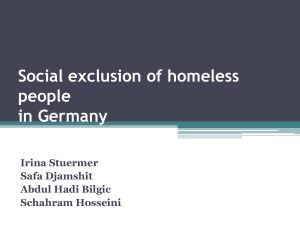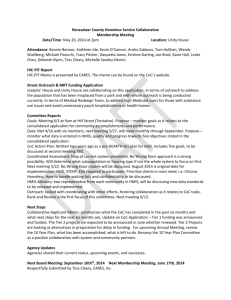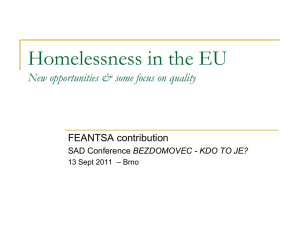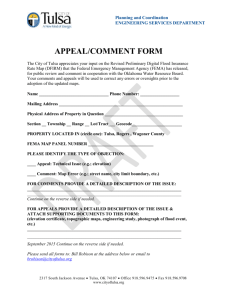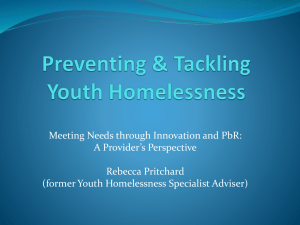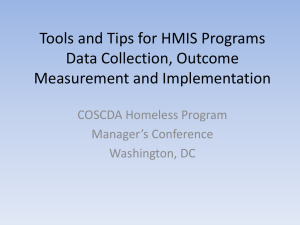A Way Home for Tulsa - Community Service Council of Greater Tulsa
advertisement
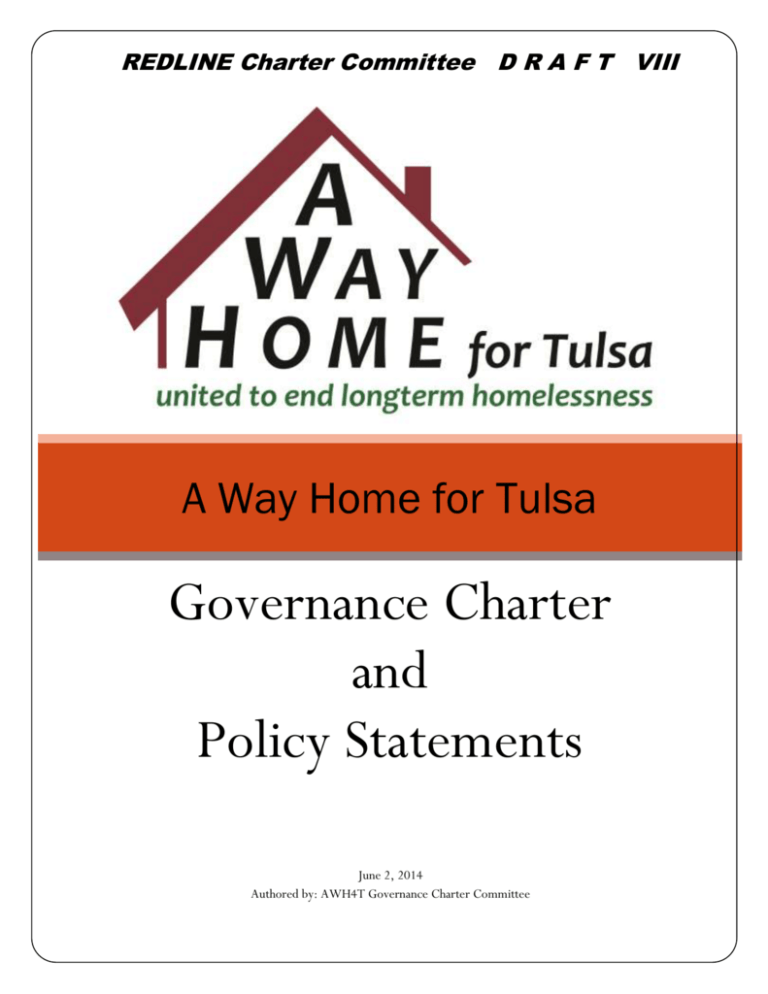
REDLINE Charter Committee D R A F T VIII A Way Home for Tulsa Governance Charter and Policy Statements June 2, 2014 Authored by: AWH4T Governance Charter Committee REDLINE Charter Committee D R A F T VIII Background In 2011, Community Service Council became the lead agency for the A Way Home for Tulsa ("AWH4T") initiative, a collaboration of 24 agencies united to end long term homelessness and provide oversight to the implementation of the Pathways intensive case management model. In March 2013, the HUD Continuum of Care Steering Committee, the Homeless Services Network Advisory Board, the Homeless Management Information System and the Pathways Program were merged with the AWH4T Collaborative to create one single Continuum of Care governing structure. The change was necessary to comply with federal HEARTH legislation but it also sets the stage for broader stakeholder participation and higher accountability for community wide outcomes. Overview A Way Home for Tulsa | 6/2/2014 The A Way Home For Tulsa Governance Council exists to plan and implement strategies that support a system of outreach, engagement, assessment, prevention and evaluation for those experiencing homelessness, or those persons at risk of homelessness, within the Tulsa County metropolitan area. AWH4T utilizes the Continuum of Care (“CoC”) model mandated by the Homeless Emergency Assistance and Rapid Transition to Housing Act of 2009 (“HEARTH Act”) amendment to the McKinney-Vento Homeless Assistance Act as further promulgated by the Department of Housing and Urban Development (“HUD”) CoC Interim Rule (24 CFR Part 578) (the “Interim Rule”). 1 The Council's primary emphasis is on providing emergency shelter, rapid re-housing, transitional housing and permanent supportive housing under the Housing First concept. The group’s work includes gathering and analyzing information in order to determine the local needs of people experiencing homelessness, implementing strategic responses and measuring results. AWH4T also manages the local process for applying, reviewing and prioritizing project applications for funding each year in HUD’s Homeless Assistance Grants competition. This AWH4T Governance Charter outlines key operational components of the CoC, which has designated itself the AWH4T Governance Council, including policies and procedures for AWH4T, its Steering Committee, its members, various Task Forces, committee members and the Community Service Council, as its “Collaborative Applicant”. The Steering Committee shall act as the board for the CoC. Mission Statement for AWH4T It is the mission of AWH4T to find solutions to prevent and end homelessness in the Tulsa County metropolitan area through partnerships among nonprofit agencies, private businesses, governmental entities, philanthropic individuals and organizations, the investment community and citizens. REDLINE Charter Committee D R A F T VIII Purpose The primary responsibilities of AWH4T under the HEARTH Act include the following: Operating the CoC Designating a Lead agency to operate a Homeless Management Information System ("HMIS") CoC planning Additionally, AWH4T's goals shall include the following: To establish and maintain an accountable, responsive infrastructure for addressing and eliminating homelessness Promote community-wide commitment to the goal of preventing and ending homelessness Provide access to funding for local nonprofit providers and governmental entities that implement strategies to rapidly re-house individuals and families experiencing homelessness while minimizing the trauma and dislocation for those individuals, their families and the local communities Promote access to and effective use of mainstream programs by individuals and families experiencing homelessness Optimize self-sufficiency among individuals and families experiencing homelessness Orchestrate a vision for preventing and ending homelessness in Tulsa and Tulsa County Encourage and develop public understanding and education on homelessness and housing issues Provide advocacy on homeless concerns to the City of Tulsa and cities located in Tulsa County Make long-range planning and policy formulation recommendations to the Tulsa City Council and the Tulsa County Commissioners Assess effectiveness, quality, efficiency, access, and availability of homeless services and supports including housing throughout the community Collect data on needs of the individuals and families experiencing homelessness through Point in Time counts and housing inventory surveys Facilitate on-going coordination and collaboration among all the components of the homeless services system for purposes of service delivery, planning and resource management, fund-raising, and policy and program development Strategize to fill gaps in homeless services and housing, avoid duplication and maximize efficiency in service provision Encourage homeless housing and service programs to adopt best practices Provide a forum for coordination among all government entities and local agencies related to homelessness and prevention Coordinate a collaborative process for the development of a CoC Homeless Assistance Grants application to HUD A Way Home for Tulsa | 6/2/2014 2 REDLINE Charter Committee D R A F T VIII Coordinate a process for evaluating the outcomes of homeless housing and services programs, especially those funded through HUD Homeless Assistance Grants Establish priorities for funding HUD Homeless Assistance Grants projects Participate in the City of Tulsa Consolidated Plan and work to align it with the strategies and goals of the CoC model Ensures operation of, and consistent participation by, HUD Homeless Assistance Grants programs in the HMIS Provide oversight to the ongoing implementation, expansion and continuous quality improvements for the Pathways program Provide oversight to the ongoing implementation, expansion and continuous quality improvements for the HMIS program Structure/Membership AWH4T membership is broad with representation from all sectors of the community including but not limited to: nonprofit and for-profit homeless service providers including health and mental health and substance abuse assistance providers, representatives from federal, state and local governments, corporations, philanthropic organizations and concerned individuals and families currently or having formerly experienced homelessness. AWH4T maintains an open membership policy and supports diversification of its membership. The inaugural AWH4T member agencies and Steering Committee members are grandfathered in at their respective positions. Regular meetings of the AWH4T general membership will be held at least quarterly. The Chair and/or Vice Chair shall preside over all meetings when present. Members may serve on a committee or task force. AWH4T duties are as follows: A Way Home for Tulsa | 6/2/2014 3 Schedule and hold meetings of the full membership at least quarterly Invite and solicit new members within the local geographic area at a minimum annually using public invitations according to established AWH4T policies Create, adopt and follow a written process to select an AWH4T Steering Committee Review, update and approve the selection process for the Steering Committee at least once every five years In consultation with the Collaborative Applicant and the HMIS Lead, develop and follow a governance charter that encompasses the policies and procedures required by HUD’s Interim Rule and HUD’s HMIS mandates, respectively, that will, at a minimum, include the following: - Empower the Collaborative Applicant to conduct an annual Point In Time (“PIT”) count of the homeless population consistent with HUD’s requirements. AWH4T will review and approve the PIT Count Plan annually. - Review, revise and approve a privacy plan, security plan and data quality plan for HMIS REDLINE Charter Committee D R A F T VIII Authorize the Collaborative Applicant to review and update the governance charter and present it for approval by the full membership at least annually Establish system performance targets (relative to respective populations and program types) by which outcomes can be measured, monitored and evaluated for continuous quality improvement In consultation with the Emergency Solutions Grant ("ESG") Grantee, establish and consistently follow written standards for: o A Coordinated Assessment and Referral system o Providing assistance with the ESG program o Operation of the Continuum of Care Insure that a Code of Conduct with a recusal process is written, followed and updated, as needed Establish a recusal process for members of the Steering Committee and the AWH4T membership, in general Meet annually to review and act on annual funding requests and scoring of applications in response to the timing requirements of the HUD Notice of Funding Availability (“NOFA”) Designate a Collaborative Applicant annually for the purpose of managing HUD’s CoC process for AWH4T and obtain HUD approval for same Coordinate with the membership and the Collaborative Applicant for oversight of the HMIS program AWH4T shall ensure that its general membership has the following representation: Representatives from the Participant Advisory Group Emergency shelter providers Transitional housing providers Permanent supportive housing providers Supportive service providers – includes all agencies providing supportive services to persons experiencing homelessness including: mental health, health care, veterans, HIV/AIDS, substance abuse, employment, legal and education services Individuals or families who are either currently experiencing homelessness or have done so in the past Homeless provision programs Outreach service providers Persons who are victims of domestic violence, dating violence, sexual assault, stalking and or human trafficking Appointed representatives from local, State and federal government entities including, at a minimum: - City of Tulsa Grants Department - Tulsa County - Tulsa Housing Authority - Department of Veteran Affairs - Any other governmental entity that may request the right to appoint a member A Way Home for Tulsa | 6/2/2014 4 REDLINE Charter Committee D R A F T VIII School districts Mental health care providers Health care providers Universities Businesses Affordable housing developers or owners Charitable organizations and philanthropic foundations Law enforcement Representatives of the Collaborative Applicant as ex officio members Representatives of other homeless service providers and advocates such as: Faith-based organizations Public housing agencies Emergency shelters Prevention providers Basic needs and emergency financial assistance providers AWH4T membership is specific to each organization that belongs to the group while leadership positions are specific to the individual. Eligibility for a leadership position is contingent upon an individual's continued affiliation with a member organization. Nominations from the public to fill any existing vacancies within the AWH4T membership will be solicited annually. Organizations applying for membership to AWH4T will be subject to acceptance by a vote by the existing members. A Way Home for Tulsa | 6/2/2014 Meetings 5 AWH4T shall: Conduct meetings quarterly. However, this schedule may be amended from time to time to suit the convenience of the members and to address pertinent issues that need to be discussed or voted on prior to the next scheduled meeting. Each meeting shall have on its agenda the opportunity for members of the public to provide input and comment. Review, approve and publish the minutes of its meetings and consider recommendations from such committees established as may be necessary to conduct the business of the AWH4T planning and operations, HMIS governance and Pathways program planning and operations. Agendas and minutes shall be published on the Collaborative Applicant’s website. The Chair and/or Vice Chair shall preside over all meetings when present. Discussion and voting during an agenda action item shall be held in accordance with Robert’s Rules of Order. Record and provide proceedings of all meetings as minutes to the membership. Members are responsible to ensure a correct email address is on file with the Collaborative Applicant . Regular AWH4T meetings shall include: REDLINE Charter Committee D R A F T VIII - Committee, subcommittee and ad hoc committee reports Ending long-term homelessness reports HMIS Lead agency reports CoC program reports Pathways program reports City / County of Tulsa reports Legislative updates Various presentations related to serving the homeless population. Voting Information should be sought from members through a variety of means (i.e., focus groups, presentations, meetings, surveys, etc.) A majority of members shall constitute a quorum for all meetings of AWH4T, its Steering Committee, committees or task forces. Votes are limited to one vote per member organization. Each organization shall designate one representative to vote on its behalf and an alternate to vote in the absence of that primary representative. The Participant Advisory Group will be the sole exception to this rule, in that, it shall have two votes. Attendance by proxy will count when establishing a quorum and votes by proxy will be accepted within the same organization. Voting by use of telephonic, faxed, mailed or emailed votes on the business of AWH4T and its committees will be allowed. In such instances, a majority of the membership of that body must participate in the voting process to constitute a quorum. Recusal by members will not adversely affect the ability of the Council to declare a quorum. In order to have voting rights, member organizations will have to have attended at least 50% of the meetings since initial membership or in the current year (whichever is less). Roll call will be taken and recorded for all votes on motions before AWH4T. A majority of those voting will determine whether a resolution is adopted or defeated. The officers of AWH4T shall be a Chair Person, a Vice-Chair Person and the Committee Chairs. The Chair and Vice-Chair will be elected by the AWH4T general membership process with nominations for these positions presented by a nominating committee formed at the discretion of the Chair. Nominations from the membership will also be encouraged. The Chair is authorized to form committees and appoint its members as needed in order to effectively plan, operate and govern the AWH4T, HMIS and Pathways Programs. In the event that the position of Chair becomes vacant, the Vice-Chair will serve in that capacity until a replacement Chair can be elected by the membership. A Way Home for Tulsa | 6/2/2014 AWH4T Officers 6 REDLINE Charter Committee D R A F T VIII In order to assure maximum continuity, the Chair and Vice-Chair will each serve two year terms. Committee Chairs will be selected each calendar year by a nominating committee formed by the Chair and confirmed at the initial meeting of the AWH4T Governance Council each year. Steering Committee A Way Home for Tulsa | 6/2/2014 In compliance with the requirements of the Interim Rule, the general membership of AWH4T will form a Steering Committee that shall be authorized to make decisions on its behalf. So that it will be representative of the relevant organizations and projects serving homeless subpopulations, the Steering Committee will be comprised of the AWH4T officers, the Chairs of the standing committees, the Collaborative Applicant, at least one homeless or formerly homeless individual and any others appointed by the Chair. Vacancies may be filled immediately by AWH4T or through the annual nominating process. 7 The Steering Committee shall: Hold meetings every month, at which the Chair or Vice-Chair shall preside. However, this schedule may be amended from time to time to suit the convenience of the members and to address pertinent issues that need to be discussed or voted on prior to the next scheduled meeting. Establish additional committees, subcommittees, task forces or work groups, as needed, to accomplish the goals of AWH4T. Review and approve the actions and recommendations by the committees , task forces or work groups. Develop the leadership of the committees Set the agenda for AWH4T meetings Comply with, and annually acknowledge receipt of, the Conflict of Interest policy Terms of service: - In addition to the Collaborative Applicant and a representative of the Participant Advisory Group, Steering Committee members shall be elected for a term of two (2) years. There is a limit of two (2) consecutive terms for any elected Steering Committee member but elected Steering Committee members may be renominated /re-elected after being out of office for a minimum of one (1) year. - In the initial year, the Nominating Committee may recommend that terms be adjusted to allow staggering. Participant Advisory Group The Participant Advisory Group is composed of a minimum of 13 members. All Participant Advisory Group members are currently experiencing homelessness or have formerly experienced homelessness. All Participant Advisory Group members have personal experience of Tulsa’s homeless service delivery system. AWH4T ensures through its application and REDLINE Charter Committee D R A F T VIII selection process that Participant Advisory Group members not only represent those with experience in accessing Tulsa homeless services and supports but also those having experienced chronic homelessness and those that represent veterans, families, unaccompanied youth, individuals with severe mental illness, chronic health conditions (including HIV/AIDS), and substance abuse disorders, and individuals who are victims of domestic violence, dating violence, sexual assault, stalking and/or human trafficking. The role of the Participant Advisory Group is to provide advice and feedback to AWH4T on a range of topics related to homelessness. Such topics include but are not limited to: Advocating for individuals and families experiencing homelessness with respect to the services and supports available or needed Improving the quality of available support and services Improving Pathways Case Management services and support Improving access to transitional, supportive and permanent housing Improving faith based connections, social inclusion and community involvement Improving health, mental health and substance abuse services and support Improving opportunities for employment and access to mainstream benefits Learning about public interest issues on which Participant Advisory Group members can provide leadership Promoting and educating our community regarding homelessness The Participant Advisory Group will elect a Chair, Vice-Chair and Secretary and will set its own agenda. The frequency of its meetings will be established in accordance with that group's own Governance Charter. Standing Committees - Finance and Fund Raising Committee - The primary role of the Finance/Fundraising Committee includes but is not limited to the development of a Funding Plan which describes roles and responsibilities, funding needs, methods and policies and procedures related to determining funding needs, fundraising, distribution and monitoring of funds. This plan is a living document and may be updated as the need arises. Any updates to this plan will be discussed and agreed upon by the Finance/Fundraising Committee and brought to the Governance Council for review and final approval. Communication Committee - The purpose of the Communication Committee is to, at a minimum, annually develop a communication plan to describe how AWH4T intends to communicate the right messages to the right people at the right time. The communication plan is used to monitor the communication events, improve A Way Home for Tulsa | 6/2/2014 While members may volunteer to serve on any committee, subcommittee and task force, members are appointed by the Chair. However, regular meeting attendance and participation is expected. The following standing committees shall be established: 8 REDLINE Charter Committee D R A F T VIII communications processes and provide a clear direction about how the target audiences will be informed about the status of projects and AWH4T activities. Governance Charter Committee - The purpose of the Communication Committee is to increase cooperation and communication among all stakeholders and to raise awareness and understanding of the issues surrounding homelessness and AWH4T’s efforts to address these issues. The Communication Committee annually develops a Communication Plan that reflects a strategic approach to managing AWH4T communication activities and measures. The Communication Plan attempts to ensure AWH4T information is accessible, accurate, relevant, timely and meaningful to stakeholders. The Communication Plan is a living document and must be reviewed and updated at least annually. All updates or revisions are recommended by the Committee to the Governance Council for review and approval. Quality Management Committee - The Quality Management Committee ("QMC") is responsible for the development and implementation of the Quality Management Program ("QMP"). The QM Committee's scope of responsibilities and accountability includes oversight of all quality improvement activities and initiatives within AWH4T as defined by the QMP. The committee meets regularly to identify and prioritize opportunities to improve quality. The QMC recommends activities to improve quality and reviews results of quality improvement efforts. A Way Home for Tulsa | 6/2/2014 The QMC obtains knowledge and understanding of operations and issues by involving and seeking input from individuals with special knowledge. The QMC seeks appropriate and meaningful data from which to make recommendations to the Governance Council for improvement. The QMC strives to encourage decisions based on trended and analyzed data. 9 The QMC coordinates and communicates its activities on a regular and consistent basis to the AWH4T Steering Committee or Governance Council and to stakeholders outside AWH4T. Housing Plus HEARTH Transition Committee - The purpose of the Housing Plus HEARTH transition committee is to create systems to measure local progress toward achieving the goals of HEARTH priorities of ending homelessness and reducing the length of time people are homeless. The Housing Plus Committee provides input on the implementation of the CoC’s common assessment and referral system, CoC and ESG performance measures and CoC policies for receiving assistance. Ad Hoc Committees and Task Groups REDLINE Charter Committee D R A F T VIII Ad Hoc committees and task groups may be created by the Chair to serve a limited purpose for a limited time. An example would be a nominating committee formed annually to generate a slate of officers and/or committee chairs for approval by the AWH4T Governance Council. Collaborative Applicant Once HUD has approved AWH4T's selection of a Collaborative Applicant, the Collaborative Applicant will be charged with managing the HUD CoC application process. Its additional duties shall also include: Submitting the CoC grant application on behalf of AWH4T Applying for and receiving CoC planning funds Consulting with CoC and ESG grant recipients regarding performance targets, evaluation of outcomes and poor performance Consulting with CoC and ESG grant recipients on the establishment and operation of a coordinated housing needs assessment system Developing a process that coordinates the consistent operation of the coordinated housing needs assessment system with respect to how the safety needs of the homeless or those at risk of homelessness are prioritized and addressed including those with specific concerns of domestic or dating violence, sexual assault, stalking or human trafficking Evaluating CoC and ESG grant programs’ outcomes and reporting to HUD Partnering with CoC and ESG program recipients to establish and enforce written policies and procedures for evaluation of the following: - Eligibility for housing assistance for individuals and families - Prioritization of eligible individuals and families to determine levels of assistance for which they may qualify (i.e., transitional, Rapid Rehousing (“RRH”) or Permanent Supportive Housing (“PSH”) including the percentage or amount of rent support Conducting the annual PIT count and an annual gap analysis of homeless needs and services including a housing inventory. Providing information necessary to complete the Consolidated Plan (“Tulsa’s Strategic Plan to End Chronic Homelessness”) HMIS Lead duties are as follows: Administer and operate the HMIS according to federal regulations Organizing, overseeing and compiling counts of the homeless population and subpopulations Helping to plan, organize, promote and carry out the annual Point in Time Count Working with the CoC Collaborative Applicant to provide education, feedback and support to the membership on improving data quality Working with the CoC Collaborative Applicant to create and review the Annual Homeless Assessment Report (“AHAR”) AWH4T Administrative Agent A Way Home for Tulsa | 6/2/2014 10 REDLINE Charter Committee D R A F T VIII Community Service Council provides fiscal management, accounting and reporting services on behalf of the AWH4T fund and other AWH4T program staffing, management and administrative responsibilities including the Pathways program. Duties include the following: A Way Home for Tulsa | 6/2/2014 11 Assumes full responsibility for the fiscal management of the AWH4T grant funds outside of the CoC and HMIS Maintains sufficient documentation for all financial and compliance audits of the AWH4T fund and Pathways program grant awards Assumes full responsibility for the Pathways program project staffing, management and administration Submits all required reports to the AWH4T funding organizations and AWH4T Governance Council Ensures adequate staffing exists to provide leadership and program leadership and management in the implementation and ongoing evaluation and improvement of the Pathways program Develops and executes professional service agreements and/or contracts between AWH4T participating organizations as necessary to perform CSC roles and responsibilities as outlined.



